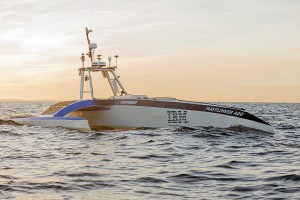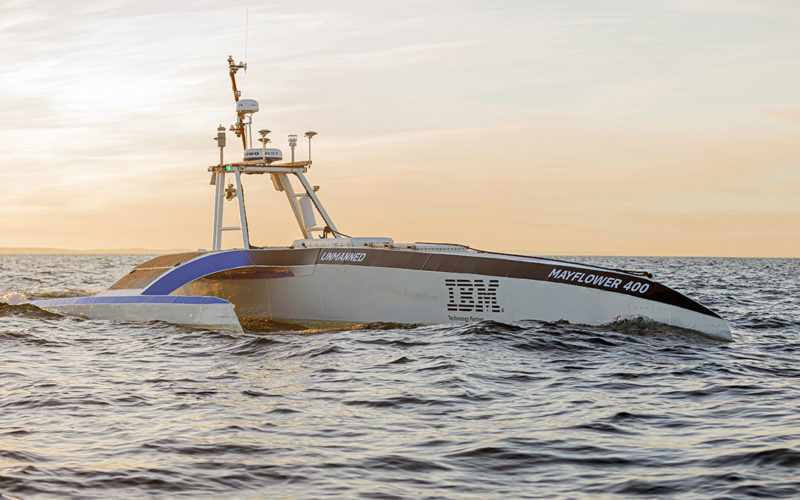
The Mayflower Autonomous Ship’s trans-Atlantic voyage ended well short of its goal after a component failed on the vessel’s hybrid drive line after three days at sea.
ProMare and IBM, two partners on the project, said the fully autonomous and unmanned MAS400 sustained a fracture in the flexible metal coupling between its generator and exhaust system. The fault could not be repaired “without human intervention,” IBM said.
“We suffered a failure in a small, commercially available component on the hybrid drive line that was unforeseen,” said Ayse Atauz Phaneuf, president of the nonprofit marine research firm ProMare. “As a result, we turned back … and made for the Isles of Scilly.”
The unmanned trimaran was built in 2020 and outfitted with IBM’s artificial intelligence suite known as Captain AI that can make decisions in real time. The vessel is propelled by electric motors powered by solar panels, batteries and a backup generator.
The concept for the vessel emerged in 2016 to commemorate the 400th anniversary of the Mayflower voyage from England to what is now Plymouth, Mass. The new ship was outfitted with myriad scientific equipment to collect data about the ocean and the climate along the way.
IBM is the lead science and technology partner on the project overseen by Connecticut-based ProMare. Other partners include the National Oceanic and Atmospheric Administration.
The ship departed from Plymouth in southwest England on June 15 and made a steady 7 knots, covering nearly 450 nautical miles over three days at sea. The vessel’s autonomous systems “worked perfectly” during that time, Atauz Phaneuf said.
The first signs of trouble with the generator coupling occurred late on June 17, and the support team made the decision early on June 18 to turn around. MAS400 sailed another 100 nautical miles before switching to a loitering mode to save battery power. A recovery tugboat ultimately towed the ship back to Plymouth on June 19.
“There simply wasn’t enough sun to charge her up, and the deteriorating weather meant that we had to save power for any emergency maneuvering that may have been required during rendezvous or if encountering another vessel while waiting for recovery,” Atauz Phaneuf said.
The maritime industry has been moving toward autonomous control of vessels for some time. ProMare acknowledged the forces driving the transition, noting that an unmanned ship reduces the cost of a voyage.
“Compared to all the costs of shipping, labor is a very small slice,” Adam Vokac, president of the Marine Engineers’ Beneficial Association, said in an email. “However, it receives outsized scrutiny as companies believe it is one of the few in their control,” unlike fuel, shipyard and docking fees.
The exhaust coupling failure that halted MAS400’s voyage is a relatively routine issue that can arise due to vibration, heat and myriad other factors. The cost of building a 100-percent foolproof engine room, Vokac said, is not a cost-effective alternative.
“Obviously, other aspects of autonomous ships like routine navigating may be more realistic, but mariners aren’t necessarily needed for routine issues,” he said. “It is the non-routine (when) humans excel over automation — like a crowded channel, bad weather, or a simple mechanical failure that can bring down the whole operation.
“In this case, they went with solar in an attempt to remove as many mechanical-failure points as possible and it still only lasted three days,” Vokac continued.
As of late July, MAS400 was in dry dock undergoing inspections and repair. The generator involved has been removed and a replacement will be installed. ProMare is redesigning the coupling to avoid a repeat failure at sea.
Project partners are considering another crossing attempt this year but are wary of potential Atlantic hurricane activity later this summer. Meanwhile, the vessel will return to the water for further research closer to its home base in England.
“Despite the setback, we’ve learned a lot,” Brett Phaneuf, director of the Mayflower Autonomous Ship Project, said in a prepared statement. “We’re more encouraged than ever that the Mayflower will safely navigate the world’s oceans in the near future.”

